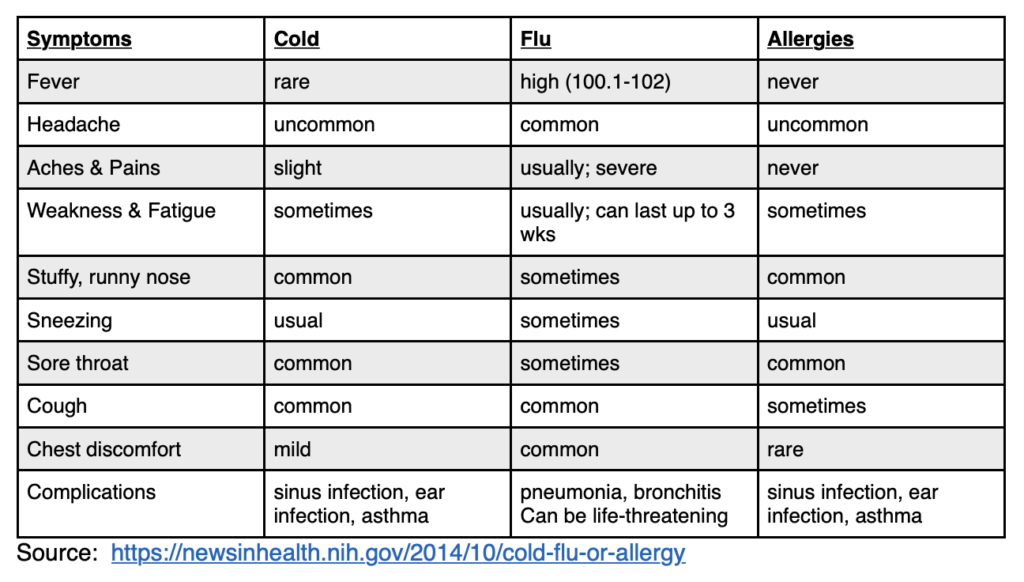We have all been there. You don’t feel great, but not terrible, either. You have a runny nose, maybe some congestion, and a bit of a sore throat. You want to treat these symptoms, but how do you know if it is a cold, the flu, or allergies?
Understanding the differences between a cold, the flu, and allergies is key. And there are some significant differences. Know the differences so you don’t take medicine that you do not need or medicine that will be ineffective.
Cold, flu, and allergies affect your respiratory system, but in different ways and in different areas of the upper and lower respiratory system.
Be sure to check out the symptom checker at the end of this article. The good news, these symptoms can be handled through Tennessee Telehealth urgent care.
Cold and Flu Viruses
Both colds and flu are caused by viruses. The virus molecule enters the body through the nose or mouth. As the virus multiples, the body recognizes it as a foreign body. Within a couple days of exposure, the body’s immune system response begins. To disable the virus, body temperature may be increased and antibodies are produced. This could mean the patient experiences fever, fatigue, and muscle aches secondary to these immune system activities. Because the virus is circulating inside the body, the symptoms are generally systemic or affect the whole body.
Generally speaking, flu symptoms are more severe than cold symptoms. Flu more often causes fever, muscle aches, and fatigue. Cold virus can cause these symptoms, but much less frequently and with less severity. Colds can leave us feeling crummy, but often don’t keep us from activities of daily living. Virus symptoms are self-limited and typically resolve in 1-2 weeks.
Allergies
Allergies are very different from a cold or flu virus. Allergies are airborne particles that are breathed in and irritate the mucosa of the airways. This irritation causes the allergy cells to produce histamine, leading to itching, fluid production, and swelling. Itching and fluid production cause runny nose, inflamed nasal and sinus tissue, cough, postnasal drip, eye irritation, and congestion in the middle ear canal.
Allergy symptoms last as long as the patient is exposed to the allergen. For example, season allergies, such as pollen seasons in the spring, summer, or fall last about six weeks.
Some allergies can become very serious, especially for patients with asthma. Repeated irritation and inflammation of the lower respiratory system can lead to a process called airway remodeling. This means that the airways are less flexible and adaptable because of the chronic swelling.
Treatment
Over-the-counter (OTC) treatment for viruses is aimed at alleviating symptoms like fever, headaches, and body aches. Allergy treatment blocks some of the histamine response, which will improve the fluid production and itching associated with allergies.
Patients should always read labels of OTC meds when treating any medical problem. Be sure there are no interactions with other medications or supplements you may be taking. Also, be sure that you are not accidentally taking too much of any medication. For example, if you have a cold, you may first take ibuprofen capsules for your headache. Then you notice the cold medication you picked up has ibuprofen in it, as well. In this case, taking both medications could be unsafe.
Why Tennessee Telehealth
When you choose Tennessee Telehealth you can rely on an accurate diagnosis, safe and effective treatment, without long waits or unnecessary expenses, and another great part – you get to be at home or wherever you are most comfortable.
Book online and feel better soon!
Cold, Flu, or Allergies?





